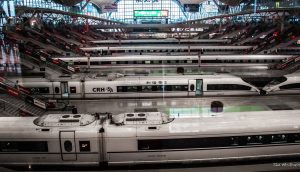Progress on a stalled Chinese-backed railway in Thailand has taken a small step forward, with the Thai cabinet signing off on a 12 billion baht ($378 million) injection of funds for the project.
The budget supplement could jump start construction on the long-delayed 253-kilometer high-speed line, which Chinese state firms are building between the capital Bangkok and the northeastern city of Nakhon Ratchasima.
According to government spokesperson Traisuree Taisaranakul, the additional money is needed for the purchase of China Railways’ faster CR Series bullet train, and the technical changes needed to accommodate it. “The additional budget will help with modernizing the system and service and will reduce maintenance costs in the long run,” she told reporters after the cabinet meeting. She added that the $5.3 billion project, originally slated for completion in 2023, is now expected to be ready in around five years.
The construction of the initial phase of the rail project involves three Chinese state-owned firms: the National Development and Reform Commission of China, China Railway International, and China Railway Design Corporation.
The Thai railway line forms an important link in the chain of China’s Belt and Road Initiative (BRI), and it is generally assumed that it will eventually extend onward to the city of Nong Khai, which sits across the Mekong River from the Lao capital Vientiane. Here it would connect up with the $6 billion Chinese railway line currently under construction in Laos, which runs from the capital Vientiane to the border with China’s Yunnan province, where it plugs into China’s own extensive high-speed rail network.
But since its inception in 2014, the Sino-Thai rail project has been beset by delays, including disagreements over design, financing and technical assistance. Since Prime Minister Prayut Chan-o-cha broke ground on the project in December 2017, construction had yet to extend beyond a 3.5-kilometer stretch of track on the outskirts of Bangkok. A decision has also not yet been made on whether to extend the Bangkok-Nakhon Ratchasima line to Nong Khai, despite the signing in April 2019 of a memorandum of cooperation between Thailand, Laos and China on the construction of a new railway bridge across the Mekong River.
Last week, Thai highway department chief Apirat Chaiwongnoi announced that a rail base for the initial 3.5-kilometer segment of rail had been completed. As a result, he said, the project will now be handed over to the State Railway of Thailand (SRT), which will work with its Chinese partners to start extending the line.
The project’s history of sluggish progress gives reason to be skeptical of the official time frame, especially against the backdrop of regional economic recession caused by the coronavirus pandemic. According to a regional economic outlook published by the World Bank this week, Thailand is facing an economic contraction of between 8.3 and 10.4 percent in 2020 – the worst outlook of any nation in Southeast Asia.
Last month, the State Railway of Thailand announced the postponement of a separate 220-kilometer high-speed rail line, which is slated to connect the country’s Suvarnabhumi, Don Mueang, and U-Tapao airports. In announcing the postponement, the government did not allude to the COVID-19 crisis, but following its recent postponement of the purchase of two Chinese submarines, it is reasonable to assume that the suspension is related to the pandemic.
There is also the question of whether Chinese laborers and engineers will be able to enter Thailand to resume work on the project. While Thailand next week will receive a flight of 120 Chinese tourists from Guangzhou, the first foreign holidaymakers to come to the country since it sealed its borders due to COVID-19, a full resumption of travel between the two countries is unlikely to happen for some time.
In the end, it may well be the virus that decides whether China’s railway ambitions surge forward, or end up on a fast track to nowhere.

































